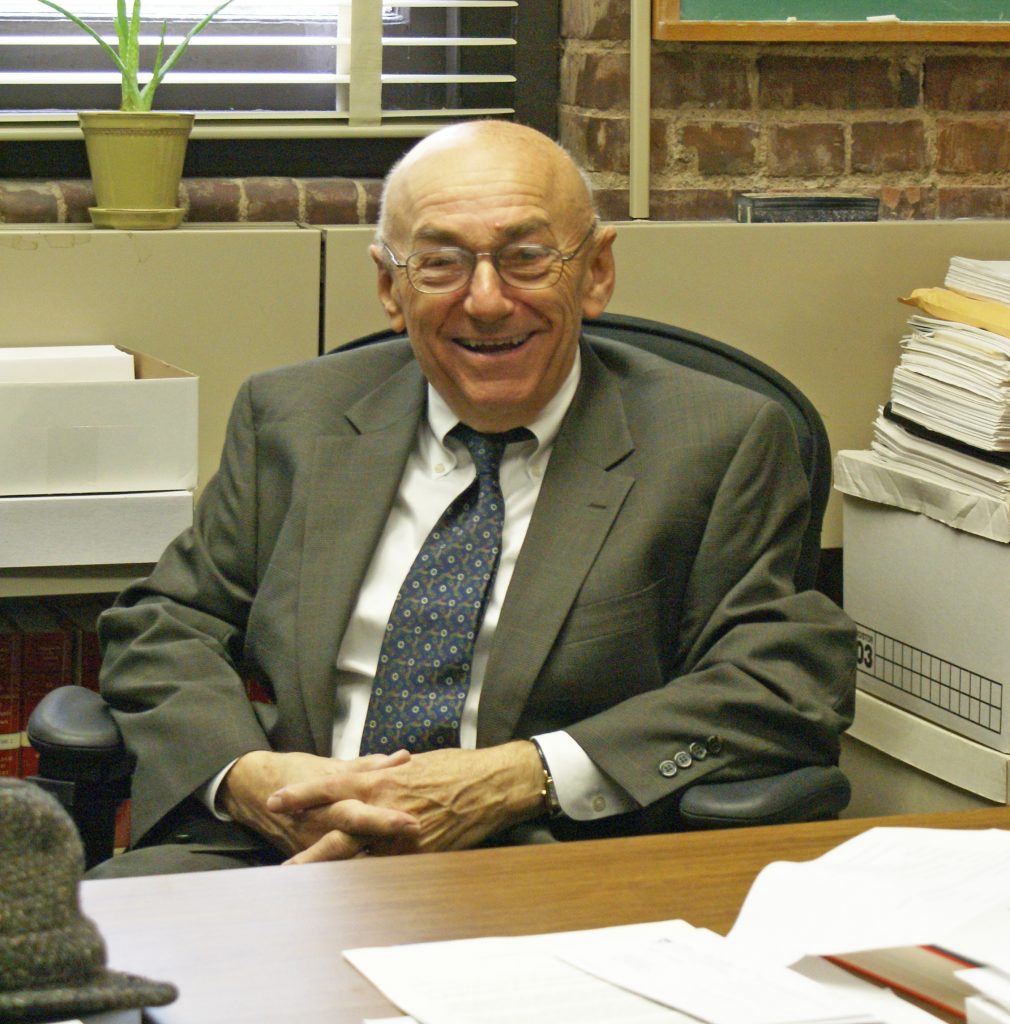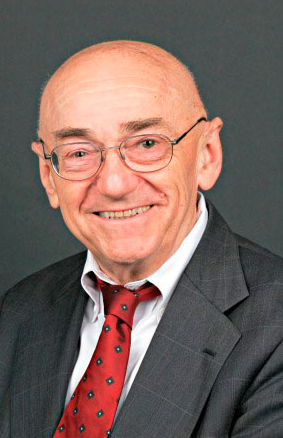John Lachs (1934-2023)
John Lachs, professor emeritus of philosophy at Vanderbilt University, has died.

Professor Lachs worked on questions concerning human nature, various topics in moral philosophy, American philosophy, the value of philosophy, and a range of other issues. He is the author of several books, including: Meddling: On the Virtue of Leaving Others Alone (2014), Freedom and Limits (2014), A Community of Individuals (2003), In Love with Life: Reflections on the Joy of Living and Why We Hate to Die (1998), and The Relevance of Philosophy to Life (1995), among others. In addition to his scholarly writing he also took up questions about the discipline of philosophy decades ago that are still live issues today, for example, in “Can Philosophers Still Produce Public Intellectuals” and “What Constitutes a Pluralistic Philosophy Department?” You can learn more about his writings here and here.
Professor Lachs joined the Vanderbilt philosophy faculty in 1967. He earned his PhD from Yale University and his MA and BA from McGill University.
The following obituary is by Michael Brodrick, a former student of Lachs’.

John Lachs: Reflections on a Life Well Lived
by Michael Brodrick
John Lachs, the Hungarian-born American philosopher, author of In Love with Life, The Relevance of Philosophy to Life, and Intermediate Man, passed away on November 14th, 2023 at his home in Nashville, Tennessee. Born on July 17, 1934 in Budapest, Hungary, Lachs was Professor Emeritus of Philosophy at Vanderbilt University.
Lachs was 10 years old on December 29, 1944, the day the Soviet Red Army encircled Budapest. When the city fell, a years-long occupation ensued. Lachs and his parents passed undetected across two patrolled borders while fleeing Hungary. Those hardships were formative. Lachs later described them as “opportunities” to develop his “latent reflective tendencies.” They called to mind “the evanescence of life and the uncontrollability of fortune,” awakening within him a desire to “know about God, the meaning of life, and the right comportment towards death.”
In his decades-long career as a philosophy professor, Lachs made the case for the relevance of philosophy to life. The rise of the modern university wrought a change in the way philosophy was practiced. Philosophy narrowed its horizons. Its largely abstract and theoretical preoccupations bore little resemblance to the ancient quest for the good life. Lachs’s objective was not merely an effort to theorize about philosophy in a different way. Lachs embodied the philosophical ideas he championed in the classroom, in writing, and in leadership positions across the profession.
Lachs first studied philosophy at McGill University. A senior seminar taught by T. G. Henderson introduced him to the writings of Spanish-born American philosopher George Santayana. Lachs would eventually become one of the foremost authorities on Santayana and a founding member of the Society for Advancement of American Philosophy.
Lachs earned his PhD from Yale where he studied with the legendary Wilfred Sellars, Paul Weiss, and Brand Blanshard. Sellars and Blanshard co-directed his dissertation. Blanshard, Lachs recalled, was “all encouragement and appreciation,” whereas Sellars was “all critical bite.” Lachs took both approaches to heart, deploying them with equal facility in his own teaching.
Lachs began his distinguished career at the College of William and Mary. He later moved to Vanderbilt University, where he remained for more than 50 years. During his time at Vanderbilt, Lachs taught over 10,000 students in his famous ethics course and was first reader on some 72 doctoral dissertations. Lachs’s generosity and respect for individuals and their choices made him a superb mentor of graduate students. “My tendency,” he explained, “is to let them write on what they wish and derive instruction from how I suggest that they trim their luxuriant growths.”
Lachs penned some 21 books and more than 150 articles. Each of these contributes to a sophisticated professional discourse, while at the same time asking a simple question: How can philosophy improve our lives? Lachs recalled learning from Santayana that “the ultimate issue in philosophy and in everyday life is the health of one’s soul.” For Lachs, the professional activities of the professor went hand in glove with the personal quest for meaning, purpose, and fulfillment.
Lachs’s belief in the personal and social value of philosophy prompted him to write one of his most celebrated books, In Love with Life: Reflections on the Joy of Living and Why We Hate to Die. In it, Lachs offers philosophy to the general public, showing in part how reflection can help us cope with life’s challenges, including fear, pain, and suffering. An important caveat is that, for Lachs, philosophy is more than just a consolation for life’s ills: it is an inherently delightful activity by which we learn how to live our best lives.
Observing the overwhelming response to In Love with Life, Lachs wrote that it showed him “the magnitude of the need people experience for philosophical reflections on what they do and what befalls them.” Lachs would continue to advance the project of meeting that need as chair of the American Philosophical Association’s Centennial Committee.
Lachs lived the pragmatism of William James, C.S. Peirce, and John Dewey, embodying the objective of improving the human condition. Whether he was preparing a graduate student for professional success, bringing philosophy to the local community, publishing on the latest problems in biomedical ethics, or listening attentively while a friend confided in him, Lachs’s default posture, as he described it, was “energetic assault upon the world.” His aim was always to make life better.
Everyday life, for Lachs, offered innumerable occasions for joy. There was the pleasure of scratching one’s head, of sitting in the sun, of frolicking in a freshly raked pile of leaves. There was the beauty of the redbud trees when they bloomed in spring. There was Mozart’s music, friendly conversation, and holding hands with your sweetheart. Lachs’s word for moments of that sort was “self-justifying.”
While Lachs considered himself an optimist, he made a point of adding that optimism, for humans, is possible only in the short term. “Pain and eventual loss,” he wrote, “appear to me inevitable elements of the human condition.” In relation to those elements, Lachs lived the philosophy of the Stoics. “At the point where we run out of ameliorative strategies,” he conceded, “graceful acceptance of whatever fate may throw our way makes for inner peace and better life.”
Ralph Waldo Emerson, upon the death of his friend Thoreau, observed that his friend could not be contained within the bounds of any role or profession, for Thoreau “[aimed] at a much more comprehensive calling, the art of living well.” Lachs heard and responded to the same calling. He articulated, taught, and demonstrated the art of living well to the highest degree. His life enriched this world immeasurably. His passing leaves a void equally immeasurable. May our memories of him remind us of the good things life holds and help us rejoice in them.
A 2017 interview with Professor Lachs:


I was one of many generations of Vanderbilt philosophy graduate students who had their first teaching experience as a TA for Lachs’ Introduction to Ethics class. It was regarded by generations of undergraduates as a course you had to take to have the full Vandy experience–I remember a student telling his father had taken it years earlier and insisted he did as well. In seminars I took with him, he was nothing but supportive and helpful. Very sad to hear there won’t be any more of his teaching and writing in the world.
What a remarkable life and legacy, so positively and profoundly impacting so many. His deep commitment to freedom, of our universal right to pursue our own good in our own ways, is a beacon. I am so grateful to have known and learned from him.
John Lachs taught an uncountably vast number of people over the years to love philosophy. I was on a plane a few years ago and a woman in the seat next to me, probably about my mom’s age, got to talking to me about her experience with philosophy. (Probably she noticed I was reading some philosophy book, and it turned out we had a Vanderbilt connection.) She felt she loved philosophy but regretted never really taking more than just the one undergrad class she had taken on it at Vanderbilt. I asked her what kind of class it was; she just remembered that it was in the early 1970s or thereabouts with “that guy at Vanderbilt, you know, uh, what’s his name–you know, the main guy who did philosophy at Vanderbilt? You know who I mean.” “Hmm. John Lachs?” I asked. “Right!” she said–and she said she remembered the class like it was yesterday.
I only met Professor Lachs once–and it left an indelible impression. He and I were breakfasting alone at an APA but tabled next to one another. I was a brand-new Assistant Professor in 1984, probably looking as lost as I really was, presenting a paper at a session that was opposite an open wine and cheese offering, and so my three or four attendees left me feeling pretty damn bad about it all. He struck up a conversation with me, asking all about me, expressing interest in what I was doing, and in general just made me feel a little bit more received in the profession. It made the whole difference in my experience of the conference, and served as an example of how I should behave in future such circumstances. In one morning he made a difference in my life.